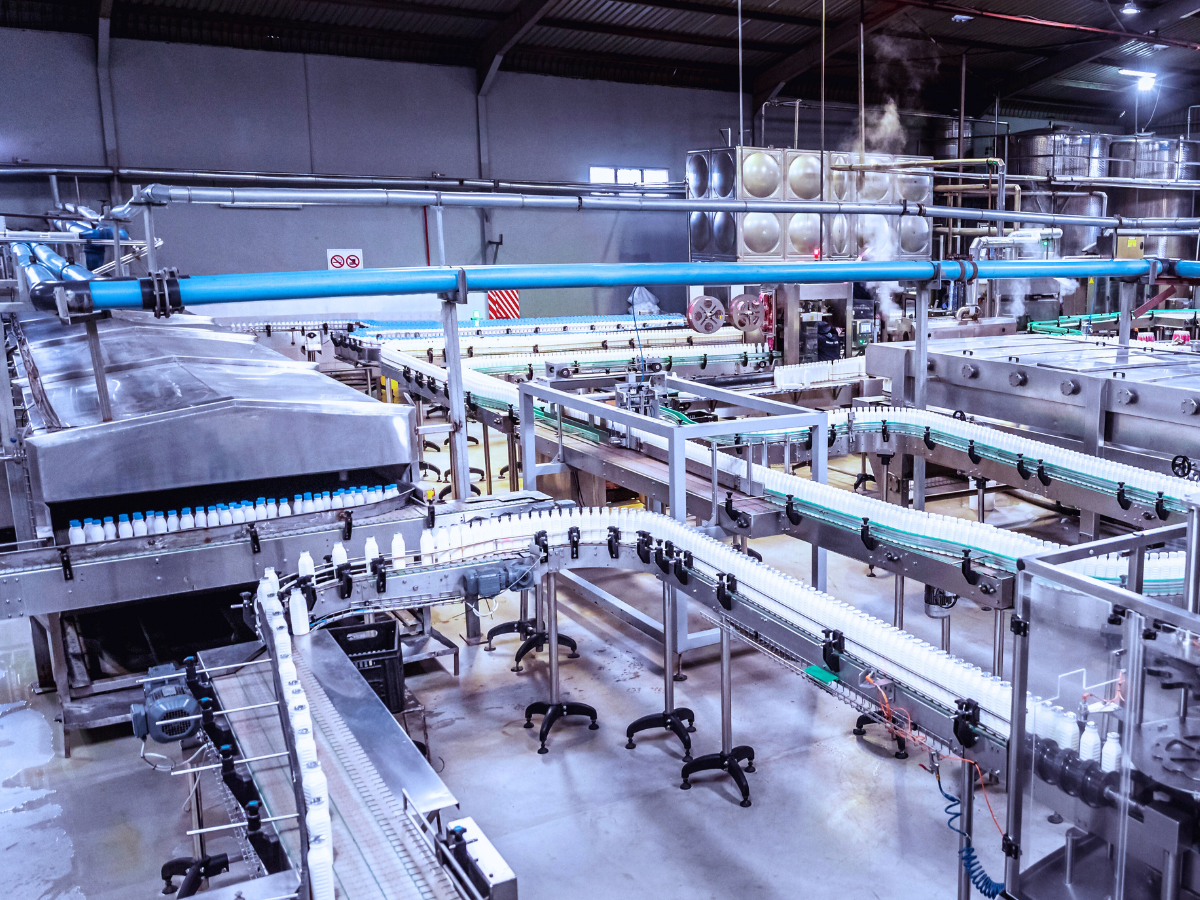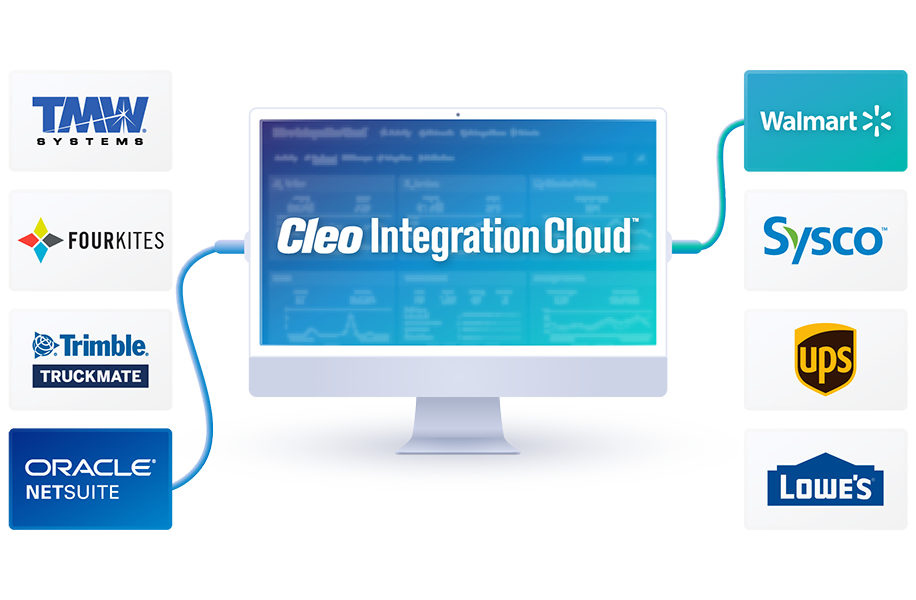Top 5 Food and Beverage Manufacturing Trends for 2024

The food and beverage manufacturing industry is a domain that not only feeds the world but shapes the very fabric of how people interact, engage, and grow. To say it’s vital to human survival and the global economy is an understatement. As such, the year 2024 sets extraordinary stakes for the food and beverage manufacturing sector—since now more than ever, innovation is a prerequisite to combat supply chain disruptions and evolving consumer demands.
In this blog, we’ll cover five of the most pressing trends that food and beverage manufacturers will likely encounter in 2024. You’ll also find examples of technology solutions that can help improve your company’s efficiency, supply chain resiliency, and relationships with customers and trading partners—so your business can stay ahead of the curve.
1. Continued Supply Chain Disruptions
Supply chain disruptions have been impacting manufacturers for years, and this is set to continue. This is due to a variety of reasons, such as international conflicts diverting trade routes, soaring fuel prices, resource availability, and changing weather patterns.
Digital Ecosystem Integration
One of the leading methods of minimizing supply chain disruptions is by harnessing digital ecosystem integration technology. Digital ecosystem integration offers several ways to reduce supply chain disruptions, making it a valuable tool for strengthening operational resilience and mitigating risk. Here are some key benefits:
Visibility
Real-Time Data Sharing: By integrating data across different partners in a digital ecosystem, organizations gain real-time visibility into inventory levels, production statuses, transportation movements, and potential issues in real time—in a centralized location. This allows for proactive responses and adjustments before disruptions escalate.
Risk Management
Predictive Analytics: Advanced analytics tools can analyze historical data that an ecosystem integration solution collects in order to identify patterns to predict potential disruptions based on various factors like weather, geopolitical events, or resource availability. This allows for preventive measures and alternative plans to be put in place.
Communication
Streamlined Communication: A fully integrated ecosystem facilitates seamless communication between suppliers, manufacturers, distributors, and logistics providers. This enables quick information sharing, faster problem-solving, and coordinated responses in the event of a disruption.
Agility
Dynamic Rerouting: When disruptions occur, integrated systems can facilitate dynamic rerouting of shipments, sourcing of materials, or adjustments to production schedules. This minimizes delays and ensures deliveries can still be fulfilled, even if the original plan encounters obstacles.
Efficiency
Cost Savings: Improved visibility, risk management, communication, and agility can lead to cost savings through optimized resource allocation, fewer errors, and reduced delays. This ultimately enhances the overall efficiency and profitability of a manufacturer’s supply chain.
2. The Rise of eCommerce Marketplaces
As the world’s population continues to gain internet access, online shopping has grown massively in popularity. This shift in shopping habits has impacted food and beverage manufacturers, as they are increasingly exploring and relying on eCommerce sales to drive revenue growth.
eCommerce Connectivity and Marketplace Support
For food and beverage manufacturers to sell their products on eCommerce stores such as Amazon and Target, manufacturers must be able to integrate with them.
Each eCommerce store has its own unique integration requirements, so widespread connectivity and protocol support are a must. Pre-built templates and maps are great tools that can help shorten onboarding and speed time-to-revenue, but are only available depending on if the integration provider offers them.
Additionally, manufacturers can use APIs to integrate their WMS with an eCommerce platform. This fosters omnichannel shopping and ensures customers can only make eCommerce purchases if there is sufficient inventory. This connection can also be used to inform consumers of up-to-minute pricing and expected shipping dates, providing greater order accuracy and fulfillment.
3. Persistent Labor Shortages
There’s no denying the labor shortage that’s been impacting manufacturers for years, and with the food and beverage industry expected to grow at a compound annual growth rate of 6.3% through 2027, the problem is only expected to worsen.
Order-To-Cash Automation
To combat the growing labor shortage and increase in food demand, companies are turning to automation to fill in the gaps. This applies to various groups within the food and beverage manufacturing industry, including everyone from harvesters and field service technicians, to factory production members and corporate professionals.
Regarding the latter, food and beverage manufacturers are enlisting the help of business process automation via EDI to streamline the order-to-cash process. By automating the order-to-cash process end-to-end, manufacturers can process, fulfill, and invoice customer orders with little to no human interaction—therefore avoiding the labor shortage dilemma.
Automating the order-to-cash process ushers other benefits as well, including:
- Improving efficiency since the technology works 24/7
- Reducing errors related to manual mistakes
- Platform scalability based on customer demand
- Ability to conduct business with larger grocers and food wholesalers that require EDI connectivity
- Visibility into all transactions that are recorded in a centralized location
4. Demand for Fresh and Frozen Products
For the past decade or so, consumers have been incorporating more fresh produce and meats into their daily diets. This will continue in 2024. This is largely due to the world’s population actively seeking healthier lifestyles and reducing their consumption of processed foods. In return, food and beverage manufacturers have started offering more fresh food options.
API-Connectivity
Offering fresh and frozen foods requires advanced storage and transportation services, as certain temperatures need to be maintained to safely preserve the foods. Therefore, food and beverage manufacturers have to enlist the services of logistics companies that offer temperature-controlled transportation services.
Additionally, advanced logistics providers can send manufacturers real-time updates regarding the temperature of a cargo container, as well as updates regarding an order's exact location. To receive real-time updates, manufacturers and logistics companies often need API capabilities, even if they already have EDI functionalities. This is because APIs process data in real-time, while EDI tends to process data in batch processing.
Food and beverage manufacturers can use these real-time updates for their records, as a way to verify if a logistics provider is a capable service provider. If an order is delivered on time and at the correct temperature, manufacturers can confidently use them for future services. The updates can also be communicated to the manufacturer’s customers (i.e. Kroger, Walmart, Costco, etc.) to ensure and inform them that the food was safely maintained throughout its delivery.
5. Hunger for Sustainable, Eco-Friendly Practices
The environmental impact of the food and beverage manufacturing industry has never been under such intense scrutiny. As consumers become increasingly educated, aware, and passionate about how their food reaches their tables, boardrooms are starting to take note and action. From reducing water usage to upcycling ingredients, to partnering with sustainable farms and reducing packaging, manufacturers are making big moves to minimize their environmental footprint. Some sustainable practices that are being deployed by food and beverage manufacturers include:
Zero-Waste Factories
Leading the charge are zero-waste facilities that exemplify the circular economy approach. Manufacturers are reimagining the factory floor by repurposing byproducts to decrease landfill waste, incorporating waste-to-energy solutions to minimize reliance on natural resources, and investing in advanced treatment processes that reduce air and water pollution.
Packaging Revolution
Innovations in packaging are revolutionizing the industry’s approach to waste. Companies are harnessing creative ways to reduce reliance on single-use plastics, by utilizing ground-breaking tactics such as biodegradable films, edible packaging, and reusable casings. Consumers can also help out by recycling the packaging they acquire after purchasing products.
Conserving Water Resources
Water is a precious resource that is essential to the global ecosystem. Food manufacturing is a notoriously high-water industry, especially when it comes to agriculture. To help reduce water consumption, food and beverage manufacturers are getting creative by adopting closed-loop water systems, as well as collecting rainwater for non-potable uses, quickly fixing leaks in factories, and upgrading inefficient equipment.
-
In 2024, the food and beverage manufacturing industry faces challenges amidst continued supply chain disruptions, persistent labor shortages, and evolving consumer demands.
To navigate these complexities, manufacturers are increasingly turning to innovative solutions such as digital ecosystem integration, automation, and sustainable practices.
Address these Food / Bev trends with Cleo Integration Cloud
One food and beverage manufacturing integration platform that combines all the technologies mentioned above is Cleo Integration Cloud (CIC). CIC is an all-encompassing solution that provides true digital ecosystem integration, featuring:
- End-to-end business process automation
- API, EDI, and MFT support
- Pre-built maps and templates for fast trading partner onboarding
- eCommerce and digital marketplace connectivity
- In-depth transaction visibility
- Flexible service offerings
- Self-service error resolution
- Any-to-any integration support
…and more. CIC has everything your company needs to create a harmonious and fluid supply chain, even when the world around you is disorganized.
If you have questions about what was covered in this blog or Cleo's products and services, contact us at sales@cleo.com, +1.815.282.7695, or by completing our brief form fill. Or explore some of our educational resources through our content hub.

About Cleo

Instantly access demo videos

Comprehensive Guide to Gaining B2B Control

Duraflame Case Study
